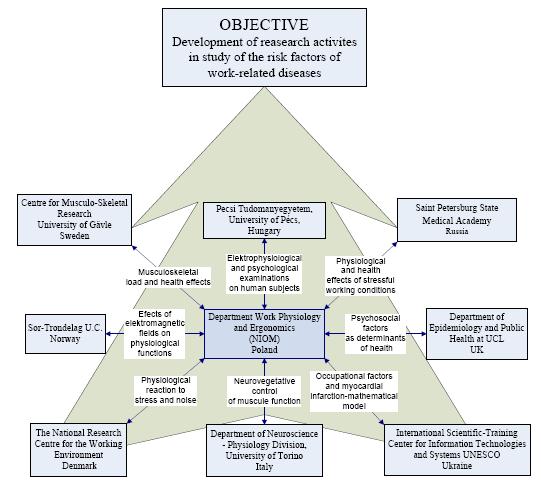REWARD
REWARD – Risk factors of work-related diseases – methods of evaluation and prevention
The overall aim of the joint research programme is to enhance the research activities in study of the risk factors of work-related diseases with special emphasis paid to cardiovascular and musculoskeletal system.
Cardiovascular and musculoskeletal diseases, are the main health problem both in western and developing countries. Among occupational and environmental risk factors the important role plays work-related stress.
The problem of work-related stress and its health consequences is particular important in countries in transitions as for example Ukraine, where changing in nature of work and globalisation cause that people have to deal with increasing work-related stress. This problem is poorly recognized.
It seems that influence of stress on cardiovascular and musculoskeletal systems could have common mechanism of pathogenicity, via neurovegetative disturbances, especially stimulation of the sympathetic and depression of the parasympathetic nervous system. The main idea behind the proposed exchange program is to set up a consortium of specialised centres to enable joint research covering all levels: from experimental to epidemiological studies, i.e. from works intended to explain pathomechanism to population research.
Such consortium, shall be able to perform extensive, multi-centre, interdisciplinary research on the link between the work environment and the cardiovascular and musculo-skeletal diseases.
Complemetaries and synergies are displayed on the figure:
Objectives:
– exchanging the knowledge on the influence of particular occupational and environmental factors on the neurovegetative regulation and cardiovascular diseases,
– familiarizing with methods for evaluation the influence of occupational factors on neurovegetative regulation (heart rate variability analysis),
– exchanging the experience on medical examination including 24-h ECG monitoring, blood pressure monitoring, heart rate variability in different occupational groups
– preparing the ideas for the study needs related to cardiovascular diseases in workers exposed to occupational factors in different countries with special emphasis paid to developing countries.
The transfer of knowledge is implemented by various activities:
– training programmes, including:
- series of researches’ visits to the Work Physiology and Ergonomics Department
of Nofer Institute of Occupational Medicine in Lodz, Poland,
- visits of NIOM’s staff at partners institutions from Russia, Ukraine, Norway, Denmark,
Great Britain, Sweden, Hungary, Italy,
– networking activities,
– pilot studies.
Any comments on the page?
Fill-in the form

![Cover: Mechanisms of chemical carcinogenesis and their impact on dose-response relationships - the examples of dioxin and benzo[a]pyrene ECNIS 6](http://oldwww.imp.lodz.pl/gal_cache/tnm_3d122379f2b61a3.jpg)








